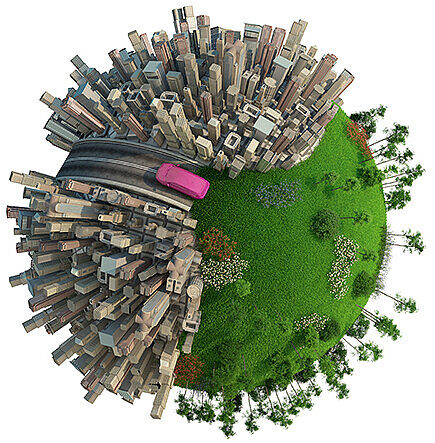

Article: Sunday, 10 March 2013
There is not enough understanding of the issues affecting our environment and climate system. This raises the crucial question: are modern managers prepared to ‘embed’ themselves in our natural world to monitor and make sense of local variability in the natural environment?
The impacts of climate change are already apparent and are having profound implications for the way we manage and organise our societies. In a complex environment, people need to pay attention to subtle cues, overcome barriers, and collectively develop ‘sensemaking’ across organisations.
If people do not pay sufficient attention, they will encounter a ‘predictable surprise’ – a crisis that could be avoided but isn’t because of existing social and economic structures.
Sensemaking is an interpretive theory in organisation and management research. The basic idea is that before we can manage something, we have to make sense of the situation. We make sense of situations by noticing certain things, ignoring others, and by attaching meanings to what we’ve noticed until we develop a plausible story. We keep this plausible story to help guide us in future sensemaking. The first step – noticing – is the most basic and most important because what we don’t notice can hurt us.
Management scholars are interested in this because the ability to make sense of complex, ambiguous or uncertain situations improves the performance of teams and organisations over time. In particular, research has shown that individuals and groups bounce back after surprise when they are able to effectively make sense of weak cues arising from a situation, and share this across actors.

Now, through management and organisation studies, we have a pretty good idea about how people make sense of our social world. However, there is less understanding of how we make sense of changes to our physical and natural world.
This is rather surprising because all organisations and societies are dependent, to some degree, upon earth systems. Making sense of physical changes to the earth, such as those occurring within our climate system, is one of the most important challenges facing humankind.
A variety of studies now consider how organisations and organising processes are influenced by physical artefacts, such as tools, technology, buildings, infrastructure, and the like, as well as through language and other social processes. Some of us would extend this to the natural environment. We would argue that materiality also arises from nature – for example, extreme weather, rain, volcanoes, fire, trees, animals and virus outbreaks, are not human inventions.
Furthermore, under certain conditions, ‘ecologic materiality’ – the interaction of dynamic biological and biophysical processes and organic and inorganic matter over space and time – becomes an important constraint for society to manage within. This kind of materiality has not been previously addressed by management theory. It may seem like an obvious point – the earth is material and we should pay attention to changes over time – but management studies have historically operated as if organisations lack biophysical foundations.
Social and organisational processes are logical areas for our field to study – managing and organising are human endeavours. But a singular reliance on this kind of expertise only makes sense under certain conditions, like when the natural environment is stable and therefore relatively benign.
In our research, we examine these and other issues by studying two events. The first is the rather straightforward but nevertheless surprising fall down a rock-face in subarctic Canada by one of the authors, who could not make sense of the subarctic landscape, and as a consequence almost died when she fell near a large set of rapids. This is an example of meeting one’s own material limits.
The second case is a reassessment of a famous historic event – the extremely volatile Mann Gulch wildland fire in Montana, which was studied originally by Karl E. Weick, the father of sensemaking theory. Significantly, we identified something that Weick missed: fire-fighters who survived the blaze were the ones able to make sense of the natural world – and the complex interaction between fire, wind, vegetation, climate and landscape.
This may also seem obvious: people need to be able to make sense of the natural environment under changing conditions. The point of our paper is that many people (including managers) are no longer able to do this. Big cities, especially those lying in coastal areas or those at risk of drought and flood, are particularly vulnerable to the effects of climate change. We might not need to be able to make sense of the environment today, but we may need to do so tomorrow.
We find evidence that actors who are ecologically embedded – those who are deeply rooted in the land in a physical and cultural sense – are better attuned to changes in ecological conditions and more actively interpret material cues across landscapes and time. Furthermore, the individual and organisational ability to make sense of a changing ecosystem reduces vulnerability and increases the chance of survival.
People can’t pay attention to everything, so they need to narrow their focus. When things appear to be different, sometimes we just ignore them, or if we do notice them, we find ourselves unable to connect the dots. This leads to misinterpretations and vulnerability. As our climate warms, the ability to adapt and manage relies upon our ability to make sense of changes in the natural environment. We call this the process of ‘ecological sensemaking’. You could also call it the ability to listen to the canary in the coal mine.
Unfortunately, making sense of climate change using natural science data is not easy for the non-expert. However, many indigenous people, who spend so much time out on the land, are keenly aware of changes to their local natural environment.
While indigenous people are not the typical subject for business management studies, their ecological expertise makes them an increasingly relevant (albeit unusual) role model for managers of climate change.
In addition, we need to listen to the experts: scientists and local people, both of whom routinely pay attention to fluctuations in the natural environment. We also need to share information across a wide selection of actors and locations. This requires a paradigm shift within organisation and management theory: from a corporate orientation to a system orientation.
To summarise: over the last two decades, management studies on sustainability have grown considerably, including a recent surge of research on climate change. However, environmental problems have not been resolved, and most of the top management journals remain focused on the firm, not the system. This is the paradox, and the opportunity. In addition, there are four key management lessons to be learned.
Focus on the system, not just the firm: we need more management studies that take a systemic perspective, and analyse cross-scale linkages between firm behaviour and ecosystem functioning.
Make better sense of climate change: we need to collaborate more deeply with experts from the natural sciences. We also need to learn how to incorporate local knowledge of climate change into our information networks. Managers should also be paying more attention to weak or subtle cues in distant places, and geographic hot spots.
Share ecological sensemaking across organisations: the material impacts of climate change will affect organisations and individuals from all areas of society. Managers therefore need to learn how to make sense of our changing climate and share this across organisations.
Anticipate predictable surprises and be ready to adapt: the incidence of extreme weather events will increase alongside global warming. We need to be ready to adapt to a new system.
In conclusion, remember what we need most of all is to make better sense of climate change. This requires managers and academics to take more of a systemic approach and collaborate with the natural sciences and local people. At the very heart of this solution is ecological sensemaking, the way people make sense of a changing environment. And before they try to make sense of it, they have to know that it is changing.
This article draws its inspiration from Gail Whiteman’s Inaugural Lecture: Making sense of climate change: how to avoid the next big flood. A transcript of this lecture is available at: repub.eur.nl/res/pub/22952/
It is also inspired by the paper Ecological Sensemaking, which was written by Gail Whiteman and William H. Cooper and published in the Academy of Management Journal 2011, Vol. 54, No 5, 889-911.


Science Communication and Media Officer

Corporate Communications & PR Manager
Rotterdam School of Management, Erasmus University (RSM) is one of Europe’s top-ranked business schools. RSM provides ground-breaking research and education furthering excellence in all aspects of management and is based in the international port city of Rotterdam – a vital nexus of business, logistics and trade. RSM’s primary focus is on developing business leaders with international careers who can become a force for positive change by carrying their innovative mindset into a sustainable future. Our first-class range of bachelor, master, MBA, PhD and executive programmes encourage them to become to become critical, creative, caring and collaborative thinkers and doers.
